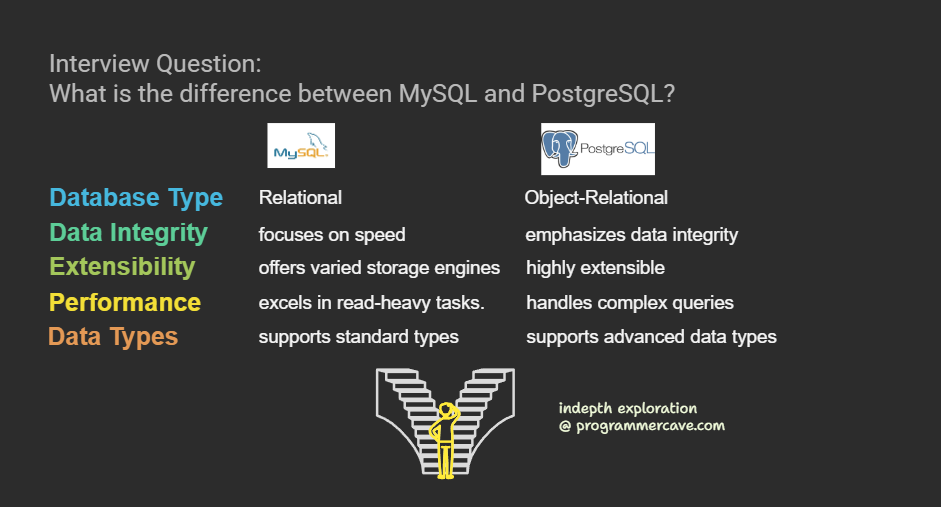Interview Question: What is the difference between MySQL and PostgreSQL?
Publish date: 2025-01-25
Tags:
<a href="https://programmercave.com/tags/DataBase/">DataBase</a>, <a href="https://programmercave.com/tags/Interview-Questions/">Interview-Questions</a>

Database Type
- MySQL: A purely relational database management system known for its simplicity and speed, making it suitable for web applications and read-heavy workloads.
- PostgreSQL: An object-relational database management system (ORDBMS) that supports advanced features like table inheritance and custom data types, making it versatile for complex applications.
Data Integrity and Concurrency
- PostgreSQL: Strongly emphasizes data integrity with Multi-Version Concurrency Control (MVCC), allowing multiple transactions without locking the database. It is ACID-compliant from the ground up.
- MySQL: Supports MVCC (especially with InnoDB) but focuses more on speed and performance, which can compromise strict data integrity. Some storage engines like MyISAM do not support ACID properties.
Extensibility and Standards Compliance
- PostgreSQL: Highly extensible, allowing users to define custom data types, operators, and functions. It adheres closely to SQL standards for predictable behavior across platforms.
- MySQL: Less extensible but offers various storage engines that can be switched based on use case. Its compliance with SQL standards has improved but still lags behind PostgreSQL.
Performance and Scalability
- PostgreSQL: Excels in handling complex queries and large datasets. Supports horizontal scaling through sharding and replication but may be slower for simple read operations compared to MySQL.
- MySQL: Known for efficiency in read-heavy workloads, making it popular for applications requiring high-speed read operations. However, its replication can be challenging in terms of consistency.
Data Types
- PostgreSQL: Supports a broader range of data types including arrays, hstore (key-value pairs), JSONB (binary JSON), and geometric types. This versatility makes it suitable for applications requiring complex data structures.
- MySQL: Primarily supports standard data types like strings, numeric values, dates, and times. It has added JSON support but lacks the advanced features found in PostgreSQL’s JSON handling.
User Interface Tools
- MySQL: Provides MySQL Workbench as a graphical user interface (GUI) tool for database management.
- PostgreSQL: Offers PgAdmin as its primary GUI tool, which is robust but may have a steeper learning curve compared to MySQL Workbench.
Conclusion
Choosing between MySQL and PostgreSQL depends on specific requirements:
- Opt for MySQL if you need a lightweight database for simple applications that prioritize speed and ease of use.
- Choose PostgreSQL if your application demands complex queries, advanced data types, or strong data integrity.
Understanding these differences can help you articulate your preferences during interviews or when making decisions about database technologies in your projects.
Citations
- GeeksforGeeks - Difference Between MySQL and PostgreSQL
- InterviewBit - PostgreSQL vs MySQL
- Integrate.io - PostgreSQL vs MySQL
- TechBeamers - MySQL vs PostgreSQL
- Bytebase - Postgres vs MySQL
- Okta Developer Blog - MySQL vs Postgres
- EnterpriseDB - PostgreSQL vs MySQL
- IBM - PostgreSQL vs MySQL
Tags:
<a href="https://programmercave.com/tags/DataBase/">DataBase</a>, <a href="https://programmercave.com/tags/Interview-Questions/">Interview-Questions</a>